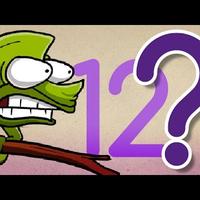12 Preguntas curiosas - CuriosaMente 22
12 preguntas curiosas.
1.- ¿Por qué nuestra especie se llama "humanos"?
Según el mito griego, el titán Prometeo.
Suelo usado para crear personas.
Esta idea continuó en Roma, donde la gente hablaba latín,
y en latín, el suelo es 'humus', y alguien que viene
de ella se llama humano.
2.- ¿El arco iris tiene un principio y un final?
No. Si lo ves desde lo suficientemente alto,
Ya verás que es un círculo.
Además, un arco iris es un efecto óptico;
No tiene una posición física. Se mueve contigo,
que se puede ver si se observan las gotas de un rociador de agua.
3.- ¿Para qué son las cejas?
Ayudan a desviar el sudor que cae de la frente,
impidiendo que llegue a los ojos,
También protegen nuestros ojos del sol,
Pero también son muy importantes para identificarse.
y comunicar emociones entre sí.
Otra explicación sugiere
Ayudan a ahuyentar a los felinos que se alimentan de humanos.
haciéndoles creer que los estamos viendo
incluso si estamos dormidos.
Al igual que las marcas de ojos en otros animales.
4.- ¿De qué color es un camaleón cuando se mira en el espejo?
Los camaleones reales simplemente se vuelven verdes debido a su reflejo.
les estresa fuera piensan que hay otro camaleón
Delante de ellos y verde es el color que sienten es más seguro.
5.- ¿Puedes crear un nuevo idioma?
Por supuesto que puede. Muchos han sido creados.
De la antigua Lingua Ignota, creada por motivos religiosos,
a Klingon de la serie Star Trek,
o Elven, inventado por Tolkien en El señor de los anillos.
Así como el famoso esperanto.
Hay muchos lenguajes artificiales,
e incluso si son geniales, solo unas pocas personas los hablan.
6.- ¿Qué vino primero: el nombre del color naranja o la fruta?
La fruta. Inglés y español
Tomó la palabra del árabe, que llama al árbol "Naranj",
una palabra que viene de "Narensh" en persa,
y "Náranga" en Sanscrit, que significa fragante,
y como llamaron los españoles a ese color
¿Antes de que conocieran la fruta?
Amarillo-rojo, y luego Anaranjado, y ahora simplemente Naranja (Naranja).
7.- ¿De qué color es el universo?
Aunque en todo el cielo hay una estrella,
parece mayormente oscuro. Esto se llama la paradoja de Olbers.
La solución es que lo veamos negro porque el universo
se expande tan rápido que extiende las longitudes de onda de la luz
hasta que se vuelvan invisibles; pero si pudiéramos verlo,
Sería este bonito color latte cósmico.
¡De Verdad!
8.- ¿Existen sirenas?
Sí, los coches de ambulancia y policía los tienen.
No, en serio, no existen.
Se cree que este mito provino de marineros de la antigüedad que,
Hambre, insolación y no haber visto mujeres.
En meses, vimos algunos animales marinos y pensé.
Eran chicas preciosas. Pobres compañeros ...
9.- ¿Qué es lo más pequeño que existe?
Los átomos están hechos de electrones, protones y neutrones,
y estos están hechos de quarks,
Las pequeñas partículas conocidas.
Pero hipotéticamente lo más pequeño.
Sería una partícula de Planck, un minúsculo agujero negro.
100 billones de veces más pequeño que un protón.
10.- ¿Cómo y cuándo será el fin del mundo?
Si el fin del mundo significa la extinción de la humanidad,
Nadie lo sabe, y hasta ahora todas las profecías han sido erróneas.
Pero si no nos preocupamos por el medio ambiente ahora,
Tendremos muchos problemas en menos de 100 años.
Si el fin del mundo significa que el planeta ya no existe.
será en 5 o 6 mil millones de años,
cuando el sol abrasa la tierra.
(Veamos cuántos suscriptores tendremos para entonces).
11.- ¿Qué pasará cuando salga el sol?
Miles de millones de años a partir de ahora el sol crecerá
Hasta que se convierta en un Gigante Rojo y destruirá la Tierra.
Entonces se extinguirá. 6 mil millones de años después
se convertirá en una enana blanca hasta que desaparezca.
Si nuestra especie es sabia y sobrevive,
para entonces nuestros descendientes habrán viajado a otros planetas.
12.- ¿Qué pasaría si una fuerza imparable se reuniera?
¿Un objeto inamovible?
Esto no puede suceder. Es un absurdo;
Si hubiera tal cosa como un objeto inamovible,
entonces una fuerza imparable no podría existir, y viceversa.
Es lo mismo que preguntar: ¿Qué pasaría?
¿Si un ser inmortal contrajo una enfermedad letal e incurable?
O el ser moriría, por lo tanto no siendo inmortal,
o él sobreviviría, y entonces la enfermedad no habría sido letal.
Imagina que alguien quiere venderte una lanza que puede penetrar.
Cualquier escudo, y un escudo capaz de detener cualquier lanza.
¿Confiarías en el vendedor?
CURIOSAMENTE
¿Te gusto el vídeo? ¡Compártelo!
¿Quieres ver más? ¡Suscribir!
¿Quieres saber qué hay de nuevo con nosotros?
Síguenos en Facebook, Twitter e Instagram.

